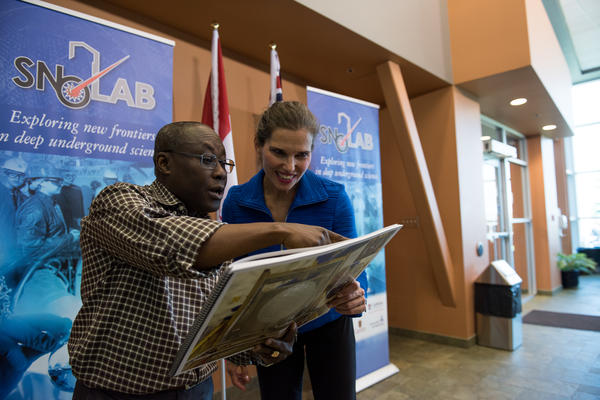From Concept to Super Structure

The DEAP-3600 experiment at SNOLAB consists of a giant acrylic vessel which is filled with 3600 kg of liquid argon surrounded by light guides and photomultiplier tubes. It’s big. And heavy. And, not surprisingly, requires a highly sophisticated support structure.
So how exactly does one build a support structure for an underground experiment? According to Doumer Horace, the president of Specialty Alloys & Stainless Ltd, the first step is getting underground to see the specifications first hand. While schematics and a list of specifications are helpful, nothing really compares to seeing and experiencing the constraints posed by DEAP’s unique location.
This wasn’t the first time Specialty Alloys fabricated experimental components – as Horace pointed out, you need to prove yourself in order to be awarded projects like this. Specialty Alloys has been doing this kind of work now for 15 years. Past projects of this type include structures for other SNOLAB experiments, a collaboration with engineering firm Hatch, and creating parts that were shipped to Moscow for assembly as part of a project there.
The DEAP-3600 support structure posed several challenges. The most obvious is its final location: the structure had to be fabricated and machined in pieces, then transported underground and assembled. In addition, Specialty Alloys was working on a tight timeline. When they were awarded the project, DEAP was already running behind schedule. The geographically diverse makeup of the DEAP-3600 collaboration further complicated things. It was an engineer from the University of Alberta who created the 36 schematic drawings Specialty Alloys was working from. This meant that, not only was there no engineer on site, the project engineer was in fact in a different time zone.
Specialty Alloys worked around these challenges, and the DEAP collaboration just published their first results last month. For his part, Doumer enjoys the challenge that working with SNOLAB presents. “I’ve always been fascinated with science, it’s been a real pleasure for me to be accepted as a supplier of some of the components that SNOLAB is using in research. I feel there is a sense of accomplishment in participating in what they’re putting together here.” SNOLAB is grateful to have local partners who are excited to be involved in bringing experimental concepts to fruition.
Jenna Saffin
SNOLAB Communications Coordinator